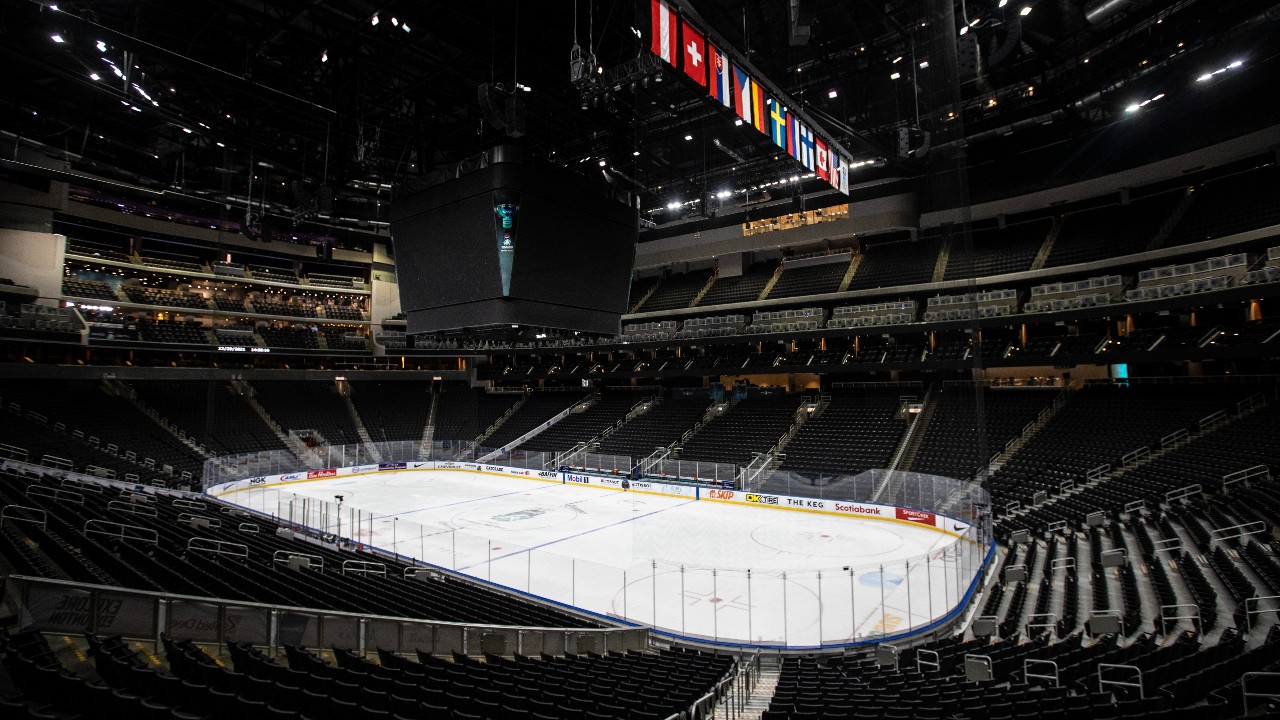
EDMONTON — It was, by any standard, a debacle with a Capital D.
The weather, the competition, the profit margins, a search for normalcy or just folksy Canadiana — the 2022 World Junior Hockey Championship will go down as everything that is wrong with everything these days. Another win for COVID-19 and another loss for those who were just looking to put a little fun in their lives, both player and fan.
And it all played out at a snuggly -29 C here in The Big E, the only city under the sun that wasn’t, well, under the sun at all this Christmas season.
“We came up against an opponent that was not on the ice, but was bigger than all of us,” said Hockey Canada’s head Tom Renney.
“The Omicron virus,” echoed International Ice Hockey Federation president Luc Tardif. “It changed everything.”
The IIHF originally forged ahead with its money maker, an under-20 tournament for men, while cancelling the women’s under-18 world championship quicker than Connor Bedard’s release. The optics were poor, and perhaps that karma came to Edmonton to roost.
But financially, they had to try.
This is the IIHF’s No. 3 revenue driving tournament after the men’s World Championship and the Olympic Games. It was also a promise made 12 months ago to organizers here, a reward for Hockey Canada and the Edmonton Oilers having hosted last year’s bubble tournament in an empty arena, with empty profits. Unlike last year, this tournament was sure to fill 18,500 seats for two weeks over Christmas, filling everyone’s stockings with their favorite Christmas gift — revenues.
Then, just before puck drop, with Omicron gaining momentum, the Alberta government decreed that games must be played in front of half-filled houses, with no food and beverage sales allowed. People who had bought eight-game ticket packages were offered four-games and a partial refund, and what ensued crippled this tournament:
Most people opted for Door No. 3. A full refund of all of their tickets, and a seat on the couch at home.
Hockey Canada has released a statement in response to the cancellation of the 2022 IIHF World Junior Championship.#WorldJuniors
— Hockey Canada (@HockeyCanada) December 29, 2021
In the end, nine games yielded a total attendance announced of just over 22,000. In reality, Canada played two games in front of less than 6,000 combined. It was a sad rendition of a beautiful song, A Charlie Brown Christmas played on a kazoo. A Canadian Christmas tradition was stripped bare by austerity and caution.
Why did they not hold the tournament inside the tight bubble in which the 2021 tournament was staged? Well, over the summer nobody saw the need for such restraint. Restraint that would have incurred huge expense and likely barred fans, something nobody wanted to repeat.
Instead, the IIHF opted for a “protective environment,” where teams had their own floors in hotels in Edmonton and Red Deer, though people from outside the tournament shared the hotels and elevators, including a wedding at the Red Deer hotel that housed players and staff.
“Our experience to start the competition, it was enough,” explained Tardif. “But quickly, when we saw the impact of the variant, we changed the protocols. We made 7,000 or 8,000 tests … and we quickly saw that we had to reinforce the protocol.
“The new variant (Forced) us to do these changes. Before that, the protective environment was enough. But Omicron changed that,” he repeated. “When we decided to change … the variant was ahead of us.”
Official Announcement: The 2022 #WorldJuniors have been cancelled due to Covid-19.
Full statement at https://t.co/TNNT2FHecn pic.twitter.com/xnPs9nDWli
— IIHF (@IIHFHockey) December 29, 2021
Provincial and national health bodies laid out rules that decreed that one player testing positive on a game day resulted in the forfeiture of a game by the rest of the team. Ridiculous? Yes, but them’s the rules.
They cancelled one game on one day. Then two the next.
“We had one crisis meeting, two crisis meetings, waiting for the results from the tests,” Tardif said. “We saw it was impossible to continue this competition in a fair way.”
The tournament was cancelled even though nobody was reported to be genuinely sick, one of the legacies of this COVID-19 era that will go down in history as strange, and perhaps quasi lawyer-driven. Or perhaps it was just bad timing: Had Omicron arrived next week — not three weeks ago — this tournament would have sailed through.
The teams arrived on Dec. 15, when the word Omicron might still be mistaken as the Irish version of an old pair of skates.
“Dec. 15 to today. Two weeks,” mused Renney. “Many things have changed.”
As it was, an early December arrival of a new variant was a deal breaker. It was too late to pivot — that Red Deer wedding had long since been booked.
“I can not imagine how disappointed the players are,” said Renney. “It is with a heavy heart that we identify with their disappointment.”
We’ll miss Matvei Michkov, the Russian dynamo who was set to take on Bedard some time in the medal round. And Bedard himself, the four-goal man, along with the magnificent Owen Power, who was like taking a trip back in time to watch a 19-year-old Alex Pietrangelo.
We’ll miss that New Year’s Eve tilt against Finland, a Suomi tsunami whenever they oppose Canada. And an inevitable memory-maker when Canada played the Russians or Americans, with everything on the line.
Who knows — maybe they’ll finish this tournament in June or July, or perhaps they won’t. Either way, we’ll miss a lot of things, when we think back on this 2022 World Juniors.
A lot of things — except for one — as the 2022 World Juniors is brought to its knees by Covid.
We won’t miss that word. In fact, we’d like never to speak again.




